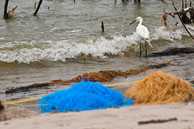Tracking Environmental Health Matters in Louisiana

The Louisiana Tracking Network helps the health department and its partners improve the health of Louisiana residents.
Environmental issues such as oil spills, and well water contamination are just a few of the problems that have affected Louisiana. In 2009, Louisiana began receiving funding from CDC to develop a statewide tracking program that is now part of the CDC’s National Environmental Health Tracking Network. The Louisiana Tracking Program helps the health department and its partners improve the health of Louisiana residents while expanding public access to information so that everyone in the state can better understand how the environment affects their health.
Tracking in Action Deepwater Horizon (BP) oil spill
On April 20, 2010, a drill rig explosion caused about 4.9 million barrels of oil to spill into the Gulf of Mexico. The explosion killed 11 platform workers and injured 17. Marine and wildlife habitats were severely affected, and the fishing and tourism industries of U.S. coastal states were devastated.

The Gulf Oil Spill severely affected marine and wildlife habitats.
The Louisiana Tracking Program responded to the oil spill in collaboration with federal and local agencies from other affected Gulf Coast states. Survey and map-based tracking systems were developed to track health complaints and environmental monitoring results. In addition, the Louisiana Tracking Program worked with the Occupational Safety and Health Administration (OSHA) to make sure that outreach materials were available in several languages and available to those with limited Internet access.
The Louisiana Tracking Program notified OSHA about workplace exposures and health complaints from emergency response workers. Response workers, residents, and health care providers were educated on topics such as personal protective equipment, seafood safety, chemicals of concern, potential routes of exposure, and associated health effects.
Educating private well water users about contamination
Louisiana has a large number of residential water wells located near to wood treatment facilities. No Louisiana law requires private well water testing. This limits the ability to evaluate possible exposures to chemicals through well water.
In partnership with the state, the Louisiana Tracking staff conducted a pilot project to link environmental exposure and health outcome data around wood preservation and treatment sites.
As a result of the pilot project, many residents who have private water wells contacted the health department to obtain a list of places where they can test their well water. This should help reduce potential exposures to contaminated well water.
For more information, visit:
CDC’s National Environmental Public Health Tracking Program: http://www.cdc.gov/nceh/tracking/
CDC responds to the Gulf Oil Spill: http://emergency.cdc.gov/gulfoilspill2010/
ATSDR identifies health risks of chemicals in the Gulf Oil Spill: http://www.atsdr.cdc.gov/stories/comptox.html
Private groundwater wells: http://www.cdc.gov/healthywater/drinking/private/wells/
- Page last reviewed: August 1, 2011
- Page last updated: August 1, 2011
- Content source:


 ShareCompartir
ShareCompartir